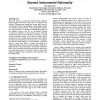271 search results - page 14 / 55 » Making games for social change |
IDC
2009
Springer
14 years 2 months ago
2009
Springer
Scheduling meetings among agents can be represented as a game - the Meetings Scheduling Game (MSG). In its simplest form, the two-person MSG is shown to have a price of anarchy (Po...
CHI
2011
ACM
12 years 11 months ago
2011
ACM
In games where skills such as targeting are critical to winning, it is difficult for players with different skill levels to have a competitive and engaging experience. Although se...
GECCO
2008
Springer
13 years 8 months ago
2008
Springer
This study proposes an agent-based model where adaptively learning agents with local vision who are situated in the Prisoner’s Dilemma game change their strategy and location as...
SAGT
2009
Springer
14 years 2 months ago
2009
Springer
In a scheduling game, each player owns a job and chooses a machine to execute it. While the social cost is the maximal load over all machines (makespan), the cost (disutility) of ...
ACMACE
2009
ACM
14 years 10 days ago
2009
ACM
How do games effect the way we problem solve, socialize, or even view the world? When we shoot do we learn to destroy obstacles instead of work around them? Does the binary world ...




